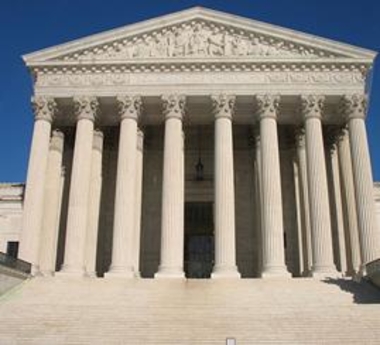Gay marriage issue squarely before high court

Washington (AP) — A same-sex couple from Michigan is putting the question of the right to marry nationwide squarely before the Supreme Court.
The couple's plea to be allowed to marry was being filed Monday. It asks the justices to hold that state laws prohibiting same-sex couples from getting married violate "our nation's most cherished and essential guarantees."
The appeal from Detroit-area hospital nurses April DeBoer and Jayne Rowse calls on the court to overturn an appeals court ruling that upheld anti-gay marriage laws in Kentucky, Michigan, Ohio and Tennessee.
Michigan officials have said they would not oppose Supreme Court review, but would vigorously defend a provision of the state constitution that prohibits same-sex marriage.
The justices also will consider appeals from gay and lesbian plaintiffs in the other three states.
The Kentucky case also involves the right of sex-same couples to marry, but Kentucky Attorney General Jack Conway has declined to defend the state ban and Gov. Steve Beshear has hired private attorneys to represent the state. The Ohio appeal focuses on the state's refusal to recognize out-of-state gay marriages because of its own ban, while the Tennessee case is narrowly focused on the rights of three same-sex couples.
Another reason the Michigan case could be attractive to the court is because it went through a full-blown trial. U.S. District Judge Bernard Friedman in Detroit struck down the state ban in March.
DeBoer and Rowse said they initially filed their federal lawsuit because they could not jointly adopt each other's children. Joint adoption is reserved for married heterosexual couples in Michigan.
They are raising three children, two of whom have special needs, DeBoer and Rowse told the Supreme Court.
Same-sex couples can marry in 32 states, parts of Kansas and Missouri, and the District of Columbia.
When DeBoer and Rowse filed their lawsuit in 2012, same-sex marriage was legal in just six states. The number had doubled to 12 by the time the Supreme Court struck down part of a federal anti-gay marriage law in June 2013. Since then, judges across the country have used the opinion by Justice Anthony Kennedy in the case of U.S. v. Windsor to support their rulings striking down state bans on same-sex marriage.
Earlier this month, the 6th U.S. Circuit Court of Appeals in Cincinnati became the first federal appeals court to uphold state bans since the Windsor decision. The ruling is in conflict with decisions issued by federal appeals courts in Chicago, Denver, San Francisco and Richmond, Virginia. The split makes Supreme Court intervention more likely.
The legal landscape looks similar to what the court confronted when it took on earlier major civil rights cases.
Thirteen states still had laws against sodomy when the court said in 2003 that states have no right to intrude on the private, personal conduct of people, regardless of sexual orientation.
Interracial marriage still was illegal in 16 states in 1967 before the high court outlawed race-based state marriage bans.
In 1954, when the court issued its landmark decision in Brown v. Board of Education, 17 states had formally segregated school systems.
Barring requests for delay on the part of the states, the court should have the legal filings it needs to schedule argument and decide the issue by late June.
by Mark Sherman, Associated Press
Copyright 2014 The Associated Press. All rights reserved. This material may not be published, broadcast, rewritten or redistributed.
The Gayly – November 17, 2014 @ 12:45pm





